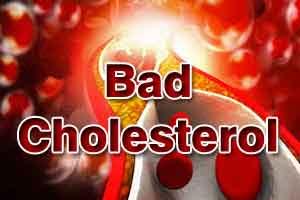- Home
- Editorial
- News
- Practice Guidelines
- Anesthesiology Guidelines
- Cancer Guidelines
- Cardiac Sciences Guidelines
- Critical Care Guidelines
- Dentistry Guidelines
- Dermatology Guidelines
- Diabetes and Endo Guidelines
- Diagnostics Guidelines
- ENT Guidelines
- Featured Practice Guidelines
- Gastroenterology Guidelines
- Geriatrics Guidelines
- Medicine Guidelines
- Nephrology Guidelines
- Neurosciences Guidelines
- Obs and Gynae Guidelines
- Ophthalmology Guidelines
- Orthopaedics Guidelines
- Paediatrics Guidelines
- Psychiatry Guidelines
- Pulmonology Guidelines
- Radiology Guidelines
- Surgery Guidelines
- Urology Guidelines
Fluctuations in bad cholesterol may lead to memory loss: Study

London : Greater fluctuations in “bad” cholesterol levels are likely to cause worse cognitive function like acute memory loss in elderly adults, says a research. The findings showed that greater fluctuations in low density lipoprotein cholesterol (LDL), or “bad” cholesterol can affect blood flow to the brain a process which could lead to memory loss and even Alzheimer’s, according to American Heart Association.
The study participants with the highest LDL cholesterol variability took 2.7 seconds longer on average to finish a cognitive test to name ink colours of colour words written in different ink (for example, the word blue written in red ink), compared to individuals with the lowest variability.
“While this might seem like a small effect, it is significant at a population level,” said lead author Roelof Smit, doctoral student at Leiden University in the Netherlands. The link between variability and declining cognitive function was found regardless of average bad cholesterol levels or use of cholesterol-lowering statin drugs.
In addition, greater fluctuations in bad cholesterol can lead to greater white matter hyper-intensity load which has been linked to dys-functioning in endothelial cells that make up the inner lining of blood vessels, and can further lead to a cardiovascular disease.
LDL cholesterol variability may also be important to neurocognitive function, said the paper published in the journal Circulation. “These results add an important puzzle piece to the emerging evidence that heart risk factors are closely related to brain health,” Smit added.
Measurements fluctuate because of diet, exercise, frequency of cholesterol lowering statins and other factors. However, these fluctuations might also reflect an increasingly impaired homeostasis the balance between food intake and energy expenditure for example, due to age or underlying disease, added J. Wouter Jukema, Professor at the Leiden University.
For the study, the team involved 4,428 elderly participants from Scotland, Ireland and the Netherlands. The participants either had pre-existing heart disease or were at a higher risk for developing the condition because of histories of hypertension, cigarette smoking or diabetes.
They examined associations between LDL cholesterol variability and four cognitive measures: colour-word test for selective attention, letter-digit coding to assess information processing speed and picture-word learning to test verbal memory in two ways immediate recall and delayed recall after 20 minutes.

Disclaimer: This site is primarily intended for healthcare professionals. Any content/information on this website does not replace the advice of medical and/or health professionals and should not be construed as medical/diagnostic advice/endorsement or prescription. Use of this site is subject to our terms of use, privacy policy, advertisement policy. © 2020 Minerva Medical Treatment Pvt Ltd